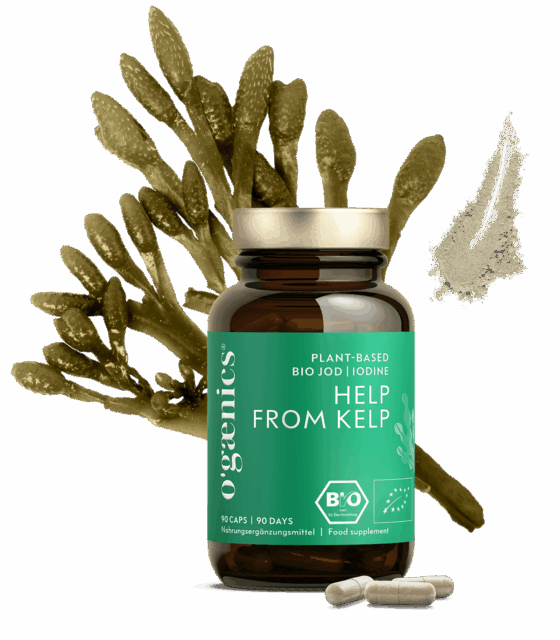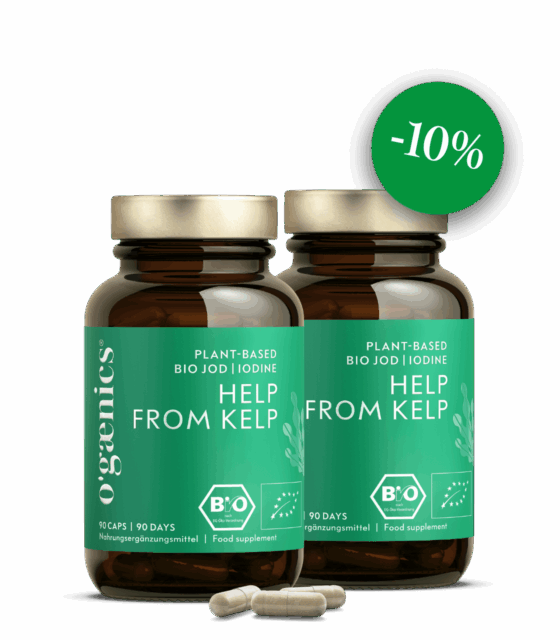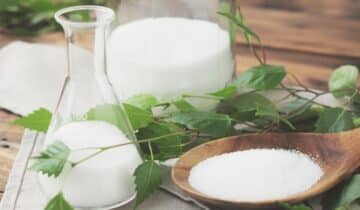01 The key role of iodine in metabolism
02 Symptoms and signs of iodine deficiency
03 Iodine and weight regulation: how are they linked?
04 How to ensure sufficient iodine intake
05 When should you consider iodine supplements?
06 Choosing the right iodine supplement
07 Conclusion: iodine and optimal metabolism
Learn more about the importance of iodine for metabolism and how iodine can support your weight loss.
A well-functioning metabolism is crucial for health and well-being. A balanced diet and regular physical activity play an important role. But there is one trace element that is often overlooked when it comes to metabolism: iodine. In this article, we will take a closer look at the importance of iodine for metabolism and how adequate iodine intake can support energy expenditure and weight loss.
The key role of iodine in metabolism
Iodine is an essential trace element needed for the production of thyroid hormones. These hormones are in turn responsible for the regulation of metabolism in the body. They influence energy consumption, metabolic rate and the breakdown of fats.
An adequate iodine supply is therefore important to ensure that the thyroid gland can produce enough hormones. However, researchers have found that about 30 percent of people in Germany do not consume enough iodine to meet their needs.
Iodine deficiency can lead to decreased thyroid function, which slows metabolism and can lead to weight gain. An underactive thyroid can reduce energy expenditure and make it harder to burn excess calories.
Symptoms and signs of iodine deficiency
Iodine deficiency means that our body does not get enough iodine, which is important for our health. Here are some signs that point to it:
- Weight gain for no reason: If you notice that you are gaining weight even though you are not eating more than usual and getting enough exercise, it could be related to an iodine deficiency. Iodine is important for a healthy metabolism that helps us burn calories.
- Fatigue and lack of energy: If you are often tired and lack energy even though you have slept enough, iodine deficiency may be a reason. Iodine helps our body to have enough energy to be active throughout the day.
- Concentration problems: If you have trouble concentrating or have trouble focusing on tasks or schoolwork, iodine deficiency could be a factor. Iodine is important for our brain and helps us think clearly.
- Enlarged Thyroid: The thyroid gland is a small organ in our neck that uses iodine to make thyroid hormones. If the thyroid gland becomes larger and a nodule forms, it may indicate iodine deficiency.
If you notice one or more of these signs, it’s important to determine if you have an iodine deficiency.
Iodine and weight regulation: how are they related?
A healthy metabolism is important for weight regulation. When the metabolism is working well, our body efficiently burns the energy from food. This helps us maintain a healthy weight. Iodine plays an important role in this process, as it regulates metabolism and influences energy consumption.
Studies have shown that iodine deficiency may be associated with decreased metabolic rate and increased risk of overweight and obesity. Adequate iodine intake, on the other hand, can boost metabolism and support weight loss. Adding more iodine to your diet can help reverse the effects of a slow metabolism because it can help your body make more thyroid hormones.
It is important to note that iodine alone is not a miracle cure for weight loss, but should only be part of a holistic approach to a healthy lifestyle.
How to ensure adequate iodine intake
To make sure you have enough iodine in your diet, you can make sure to include enough iodine-rich foods in your meals.
Seaweed (such as kelp, nori, kombu, and wakame) is one of the best sources of iodine in the diet.
Sea fish such as cod, haddock and salmon are also excellent sources of iodine.
Seafood such as shrimp, mussels and seaweed also contain high amounts of iodine.
By regularly incorporating these foods into your diet, you can ensure that you are getting enough iodine.
Salt can also contribute well to your iodine supply. Note, however, that sea salt, Himalayan salt and fleur de sel contain hardly any iodine. So if you use salt at home, make sure it’s iodized salt. However, you should keep in mind that iodized table salt always contains synthetically produced iodine, which may not be the best solution for your health.
When should you think about iodine supplements?
It is important to note that a balanced diet is basically the best way to get the nutrients you need, including iodine. In most cases, we can get enough iodine from our diet and do not need supplements.
However, it can be challenging to consume enough iodine-rich foods every day, especially if you have stress in your daily life or you travel a lot. An iodine supplement in the form of an easy-to-take capsule can provide a convenient and consistent supply of iodine to support your metabolism on a daily basis , regardless of your eating habits or circumstances.
Choosing the right iodine preparation
If you’re thinking about supplementing with iodine, it’s important to choose a natural iodine supplement. Natural iodine comes from natural sources such as algae, especially kelp(E.g. HELP FROM KELP Plant-Based Iodine from Ogaenics). It is better than synthetic iodine produced in the laboratory.
Your body can better absorb natural iodine. Natural iodine supplements such as those made from kelp (e.g. Help From Kelp by Ogaenics) also contain many other minerals and trace elements that benefit your metabolism and are good for you.
Conclusion: Iodine and the optimal metabolism
In summary, iodine plays a significant role in metabolism. An adequate iodine supply can boost metabolism, increase energy expenditure and support weight loss.
If you want to understand even more deeply how you can boost your metabolism holistically at a cellular level – for example via the enzymes AMPK and SIRT1 – read our great metabolism guide here: How to boost your metabolism naturally.
It is important to include enough iodine-rich foods such as algae, fish and seafood in your diet every day and to take supplements if necessary to ensure a normal metabolism and healthy fat burning. A natural dietary supplement with iodine from algae can make your daily iodine supply easier if you are on the go a lot.
“Impact of seaweed intake on health.”
Murai, Utako et al, European journal of clinical nutrition vol. 75,6 (2021): 877-889.
“Iodine”
Federal Institute for Risk Assessment https://www.bfr.bund.de/de/a-z_index/jod-4600.html | accessed on 01.06.2023








 No products in the cart.
No products in the cart.